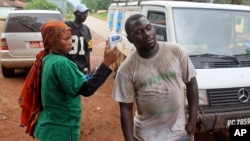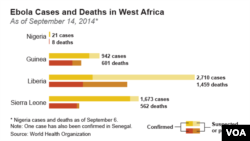The World Health Organization says it will not be deterred in efforts to combat Ebola in Guinea and other West African countries by the killing of a team of educators trying to raise awareness of the disease in a village in Guinea.
“We need to continue to combat against Ebola. We need to investigate about these murders, but they should not stop us. We should continue the dialogue with the community. We should continue to explain our work," WHO Technical Officer and Ebola specialist, Pierre Formenty, told VOA.
"We should continue to show our empathy with the victim, with the families, with the community. Without that again, we will not be able to make our messages understood by the population and we will not be able to control it," he added.
Earlier Friday, the Guinean government said it was stopping Ebola education activities in the country’s southeast after eight missing health workers and journalists were murdered there this week. Their bodies were found in a septic tank in a primary school in a nearby village on Thursday, reportedly killed by villagers fearful of the disease and suspicious of official efforts to combat it. Two other workers remain missing.
Authorities have arrested at least six people in connection with the attack.
Team allegedly accused of lying
A government spokesman told VOA's French to Africa service that some people do not believe Ebola exists, or that the delegation came to kill people.
The regional anti-Ebola effort has been hampered by widespread fears and misinformation about the disease.
A local reporter told VOA by telephone that villagers accused the delegation of spreading lies about Ebola.
The delegation was trying to educate locals about Ebola, said Guinea’s prime minister, Mohamed Said Fofanah. Villagers in Wome, as in other places, are still “intoxicated by information making them believed this sickness does not exist or was created to eliminate them.”
Outreach activities have become “impossible” in the southeast, said Dr. Fanta Kabba, permanent secretary at the Ministry of Health. She said efforts there will now focus just on treating the sick.
“We are waiting for more details” and trying to figure out why locals resist, she said. ”… Putting in place the strategies to fight Ebola has become impossible. We cannot act when we are being prevented from acting.”
WHO spokesman Tariq Jasarevic says the murders in Guinea show how challenging the effort is. He's been to the affected area and says it will be necessary to fine-tune the Ebola information message.
“It takes really the right approach. What we were hearing that some early interventions, teams would come without really properly explaining what they were doing," he said. "This is understandable because people want to go fast. Teams want to go fast and do their job.
"But, then it was realized basically that there has to be a proper protocol," he noted, " that you really have to go not only to village leaders and community leaders-When we went there, we really had to get all the village to a central place and talk to all of them for three hours.”
Jasarevic says the more patient approach paid off, and after three hours of talking, the villagers brought out three people suspected of having Ebola so they could be tested for the disease.
Third attack on health workers
This is third major attack on health workers in southeastern Guinea since the regional outbreak began there early this year.
Minister of Communication Alucine Makanera, who was in Wome, told VOA the murdered workers had marks indicating they were attacked with machetes and stones.
"We have the state prosecutor with us to find out the cause of the attack," Makanera said. “He has already opened judicial investigations, and within few days or weeks we should know more."
Many residents of Wome fled following the attack, he said, and security forces are deployed there now. Authorities have arrested at least six people in connection with the murders.
The incident has sent shock waves through the country, with many Guineans calling for strong sanctions against the culprits.
Sierra Leone on lockdown
The streets of Sierra Leone's capital were mostly empty Friday, as the nation began a three-day lockdown to find hidden Ebola cases and stop the spread of the deadly disease.
Tens of thousands of health workers are going door to door in the West African country, informing people of how to avoid Ebola and asking suspected Ebola patients to come to treatment centers.
Health care workers in Sierra Leone aim to hit every household in the country of six million. During their neighborhood canvassing, they are handing out bars of soap and information on how to prevent infections as well as trying to isolate the sick.
President Ernest Bai Koroma appealed to all Sierra Leoneans to stay home Friday, Saturday and Sunday, saying in a televised address that "extraordinary times require extraordinary measures." Critics say the exercise could be chaotic and ineffective.
The Ebola outbreak in West Africa is of historic proportions. It has killed more than 2,600 people across West Africa this year - including more than 560 people in Sierra Leone.
Sierra Leone's six million residents were told to stay home Friday, Saturday and Sunday while volunteers go door to door, looking for hidden Ebola cases and giving people information on how to avoid the deadly disease.
Health experts have criticized the shutdown, arguing the coercive measures could drive some people into hiding and could be extremely hard to implement.
U.N. Secretary-General Ban Ki-moon has announced the creation of the U.N. Mission for Ebola Emergency Response to be based in the affected region.
The United States announced this week that, at Liberia's request, Washington would deploy 3,000 U.S. troops to West Africa to coordinate the medical and humanitarian response to Ebola.
The soldiers will be based in Monrovia and tasked with training medical workers, managing supplies and building new treatment facilities.
China offers more aid
On Thursday, China committed 200 million yuan, or about $33 million, in new emergency aid to the U.N., targeted to containing Ebola epidemic, the Associated Press reported. The country also offered $2 million to the World Health Organization and the African Union to fight the disease. A team of 59 Chinese laboratory specialists arrived in Sierra Leone Thursday to assist with testing. To date, China has sent 174 medical experts to the region.
WHO chief Margaret Chan said earlier this month "human resources" are the biggest need in response to the outbreak.
Chan said "we most especially need compassionate doctors and nurses" who know how to comfort patients despite the barriers of wearing personal protective equipment and working under "very demanding conditions."
A French volunteer nurse working for Doctors Without Borders who contracted Ebola in Liberia returned home Friday. She is now receiving experimental treatments.
Some information for this report was drawn from Reuters and the Associated Press.





